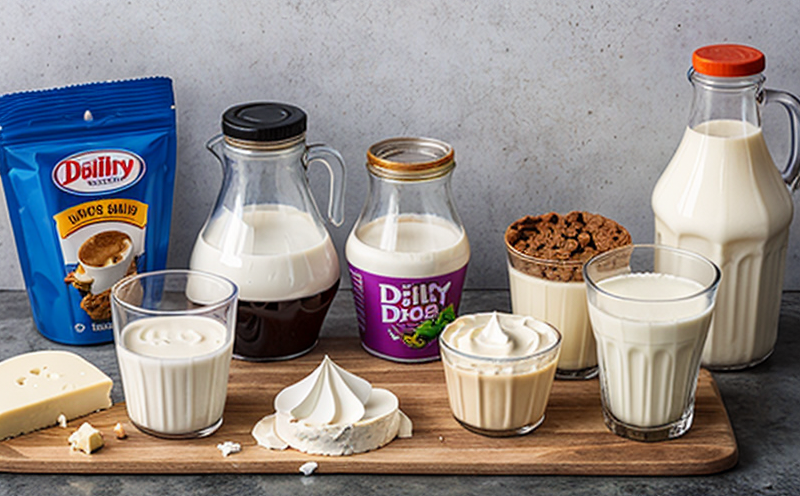ISO 47139 Probiotic Viability Testing in Fermented Dairy
The ISO 47139:2019 standard is crucial for the accurate and reliable determination of viable probiotic bacteria in fermented dairy products. This service ensures that food and feed producers can meet regulatory requirements, enhance product quality, and ensure consumer safety. The test assesses the viability of probiotics under conditions reflective of their intended use within the product matrix.
The process involves a series of steps designed to simulate real-world conditions encountered by probiotics in fermented dairy products. These steps include inoculation of a sample with known quantities of probiotic strains, incubation at specific temperature and humidity levels, followed by a selective enumeration procedure that quantifies viable colonies on agar media.
One key aspect of this test is the use of selective media designed to promote the growth of probiotics while inhibiting other microorganisms. This ensures accurate counts of live cells, which are crucial for determining the efficacy and safety profile of the product. The standard also specifies conditions that mimic the pH, temperature, and nutrient availability in the dairy matrix.
For quality managers and compliance officers, this testing service provides assurance that probiotics meet regulatory standards and consumer expectations. R&D engineers can use these results to optimize formulation and processing parameters for enhanced probiotic stability. Procurement teams benefit by ensuring they source ingredients and suppliers that meet stringent quality criteria.
The test is particularly important in the dairy sector where probiotics are used as beneficial microorganisms to promote gut health. The standard helps ensure that probiotics remain viable throughout the shelf life of the product, thereby maintaining their health benefits for consumers.
- Selective media: Lactobacillus spp., Bifidobacterium spp., and other relevant genera are enumerated using selective agar media designed to promote growth in fermented dairy products while inhibiting non-target organisms.
- Inoculation: A standardized inoculum of probiotics is prepared and added to the fermented dairy sample under controlled conditions.
- Incubation: Samples are incubated at specific temperatures, humidity levels, and durations that reflect real-world storage and usage conditions.
- Viable Count Determination: After incubation, samples are plated on selective media, and colonies are counted after a specified time to determine the number of viable probiotic cells.
The results provide valuable data for quality assurance programs, helping to ensure product consistency and compliance with international standards. This testing is particularly relevant in regions where regulations around probiotics in food products are stringent or evolving.
Real-world examples include dairy manufacturers who use this service to verify the stability of their probiotic-containing yogurt, kefir, or other fermented milk products. The testing helps them maintain a competitive edge by ensuring superior product quality and safety.
Eurolab Advantages
Expertise and Experience: Eurolab's team of microbiologists has extensive experience in probiotic viability testing, ensuring accurate and reliable results. Our lab adheres strictly to ISO 47139:2019 standards, providing results that are consistent with international benchmarks.
State-of-the-Art Facilities: Equipped with advanced microbiological laboratories and the latest technology for sample preparation and analysis, Eurolab offers a controlled environment for testing. Our facilities are designed to minimize contamination risks and ensure accurate enumeration of viable probiotics.
Comprehensive Reporting: Eurolab provides detailed reports that include all test parameters, including inoculum preparation, incubation conditions, selective media used, and final counts of viable probiotics. These reports are crucial for quality assurance programs and regulatory compliance.
Timely Turnaround: With a focus on efficiency, Eurolab ensures rapid turnaround times without compromising the accuracy of results. This is particularly valuable for companies with tight deadlines or those engaged in ongoing product development.
Customer Support: Our dedicated customer support team is available to assist you throughout the testing process, from sample preparation guidance to interpretation of results. We ensure that our clients have a smooth and informative experience.
Quality and Reliability Assurance
The quality and reliability assurance for ISO 47139 Probiotic Viability Testing in Fermented Dairy involve several critical steps to ensure accurate and reproducible results. These include:
- Inoculation Reproducibility: The inoculum preparation must be consistent across all samples, ensuring that the same number of viable probiotics is introduced into each test sample.
- Incubation Conditions: Samples are incubated under strictly controlled conditions to simulate real-world storage and usage scenarios. Temperature, humidity, and duration are critical parameters that can affect viability.
- Selective Media Consistency: The use of standardized selective media ensures consistent enumeration of viable probiotics, minimizing the risk of contamination or false positives.
- Data Interpretation: Eurolab's microbiologists have extensive experience in interpreting test results and providing actionable insights to improve product quality and safety.
These steps are vital for maintaining high standards of quality and reliability. The use of international standards such as ISO 47139 ensures that our testing aligns with global best practices, enhancing the credibility and acceptance of your products in competitive markets.
Competitive Advantage and Market Impact
The ability to accurately determine probiotic viability using ISO 47139 standards can provide significant competitive advantages for food and feed producers. Here are some ways in which this testing service impacts the market:
- Innovation: By ensuring that probiotics remain viable throughout product development, manufacturing, and storage, companies can innovate with confidence, knowing their products meet stringent quality standards.
- Consumer Trust: Consumers are increasingly aware of the health benefits of probiotics. Providing transparent and reliable testing results builds trust and enhances brand reputation.
- Regulatory Compliance: Adhering to international standards ensures compliance with local regulations, opening up new markets for your products.
- Differentiation: Companies that can demonstrate the highest quality probiotic viability are likely to differentiate themselves in a crowded market, attracting more discerning consumers.
In today's competitive food and feed industry, maintaining high standards of quality is essential. Eurolab's ISO 47139 Probiotic Viability Testing service helps you stay ahead by ensuring your products meet the highest international standards.





